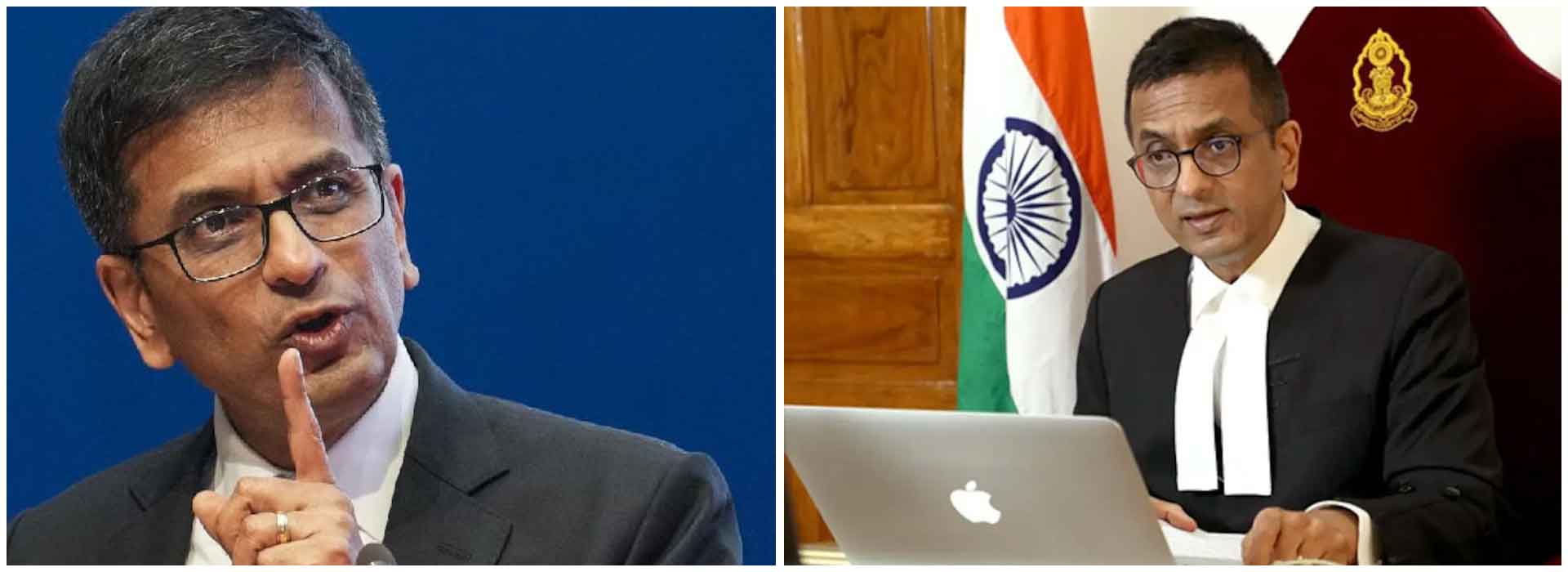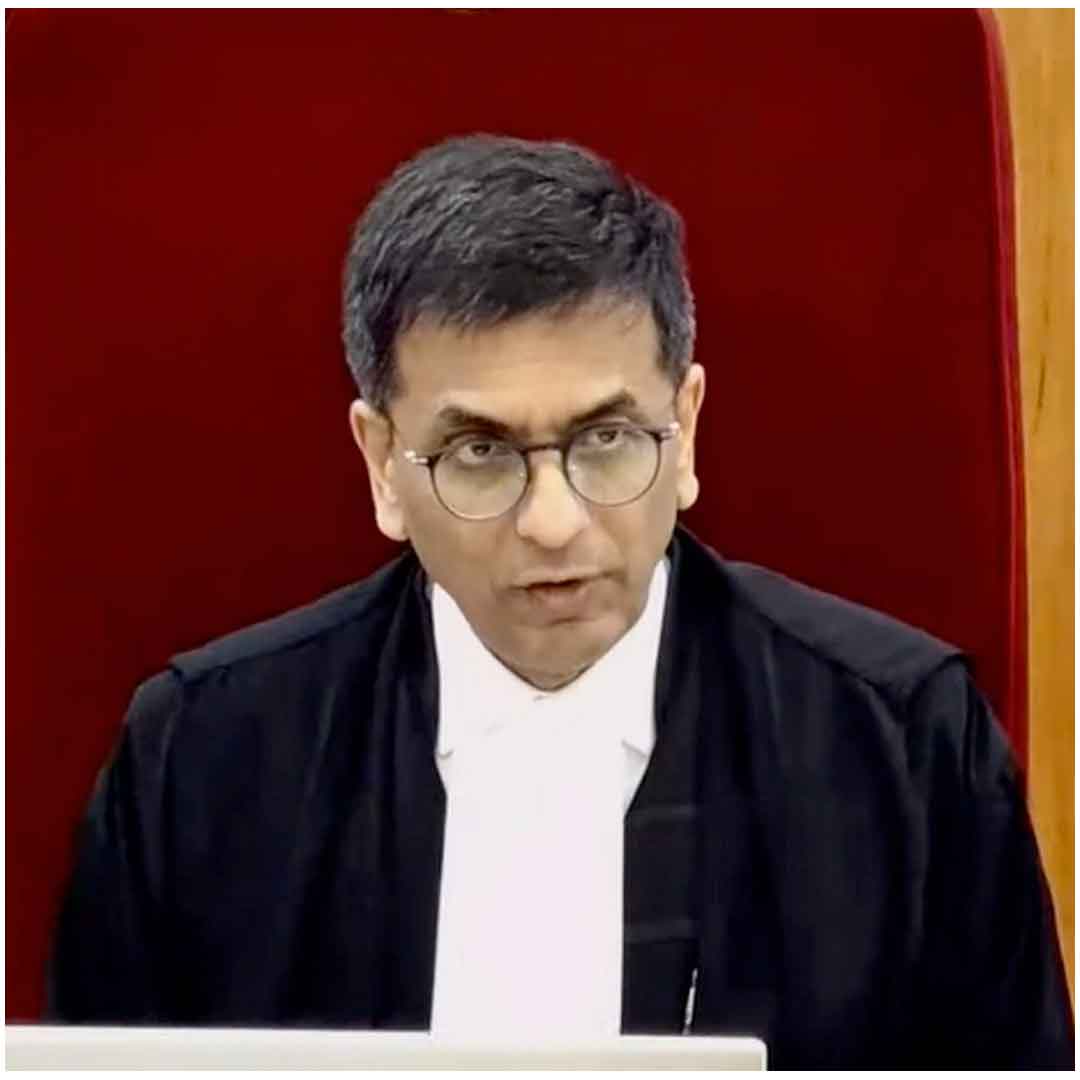CJI shares his thoughts on serving the needy as the greatest joy on final day in office

On his final day in office, the Chief Justice of India D Y Chandrachud (CJI) shared a heartfelt message on the true joy he’s found in serving those in need. His reflections were less about the technicalities of law and more about a personal philosophy that has guided him through his career.
He spoke about why helping the needy brings the greatest satisfaction, how it has shaped his outlook, and why he believes that service to others is the most meaningful part of a life in law.
Throughout his time as CJI, he mentioned, he’s often been reminded that his role wasn’t just about interpreting legal statutes but about ensuring justice for people who might not have a voice.
In law, titles and accolades come with hard work, but they can’t match the reward that comes from helping those without the means to help themselves.
Finding Joy in Service
In his farewell speech, the CJI emphasized a message that can resonate well beyond the walls of the courtroom: that true joy comes not from personal achievements but from making a positive impact on others.
This philosophy, he explained, guided him not only through the pressures and decisions required in his judicial role but also through times of personal doubt or challenge.

“Helping someone who is unable to repay you, who may not even remember you, is a joy unlike any other,” he remarked. For the CJI, this isn’t just a thought—it’s a lived experience.
He recalled specific instances where helping individuals from vulnerable communities gave him a sense of purpose. Even in the most challenging legal cases, his belief in serving the public kept him grounded.
Read Other News
- Australia introduces world’s first law barring under-16s from social media platforms
- Lawrence Bishnoi gang warns those supporting Salman Khan after Baba Siddique murder
- Bombay High Court urged to take action in Badlapur minor’s sexual assault case
- Understanding drunk driving laws in India for adults and minors
Empathy and Compassion in Law
Law is sometimes seen as a discipline focused on objectivity, with strict rules and procedures. However, the CJI’s perspective emphasizes that law, at its heart, is about people. He shared his thoughts on why empathy and compassion are essential in the legal profession.
When dealing with cases involving marginalized communities or individuals lacking resources, understanding their struggles is crucial.
“The law should never be a barrier to justice but a bridge,” he said. This belief, he noted, has been a driving force in his career. Justice, as he sees it, should always lean toward compassion, especially when serving those who may not have the power or knowledge to navigate the complexities of the legal system.
The CJI highlighted that, while it’s tempting to view the judiciary solely as a place of rules, it must also be a place of empathy. His advice to young lawyers and judges was simple but powerful: keep sight of the people they serve and let that guide their practice.
For him, empathy and compassion are not just traits to have—they are essential to creating a more just society.
The Responsibility of the Legal Profession
The CJI’s speech carried a strong message about the responsibility of those in the legal profession. He emphasized that everyone in law, from the most junior lawyer to the most senior judge, has a role in making society more just and equitable.
He urged the next generation of legal professionals not to be driven solely by ambition or career milestones but by the desire to make a difference.
“Titles and success may feel rewarding, but they’re fleeting,” he shared. “What stays with you, what gives you peace, is knowing you helped someone.” He encouraged legal professionals to prioritize the impact of their work on the lives of others rather than focusing on accolades.
In doing so, he believes that one’s career becomes a journey of meaningful service rather than a mere pursuit of success.
Overcoming Challenges for the Sake of Justice
Reflecting on his years in office, the CJI shared that standing up for justice is not always easy. There were times when he faced tough choices, times when decisions came with backlash or controversy.
Yet, he remained steadfast, guided by the belief that the role of the judiciary is to uphold what is just and right, even when it’s unpopular or difficult.
Some of the most challenging moments in his career, he recounted, were those where he had to make decisions that didn’t align with popular opinion.
These decisions were often the most rewarding, as they allowed him to help those who might otherwise be overlooked. These instances, he noted, underscore the importance of courage in the legal profession.
Standing firm for what is right and just, especially when it benefits those who are often left out, gave him a sense of fulfillment that no award or recognition could match.
The CJI’s message here was clear: true fulfillment in the legal field, or in any field, comes not from external validation but from upholding one’s values and making a positive impact.
A Call to Serve
As he closed his speech, the CJI’s message expanded from the legal community to society at large. Service, he believes, is not exclusive to any profession; it’s a calling everyone can answer.
Whether in law, healthcare, education, or any other field, the opportunity to serve others is always present. And he urged, it’s in these acts of service that one finds life’s greatest rewards.
Serving others, he noted, brings a joy and peace that no material success can offer. He challenged those listening to consider how they, too, could incorporate service into their lives. This message, he hoped, would inspire others to look beyond themselves and realize the power they have to make a difference.
Leaving a Legacy
For the CJI, this final day in office was not just a farewell but an opportunity to leave a legacy rooted in service, empathy, and compassion.
He acknowledged that his journey has been marked by achievements and challenges, but the moments that stand out are those where he could help others. These moments, he believes, are what define a fulfilling career and a meaningful life.

His words left a lasting impression on those present, offering not only insight into his own journey but a call to action for all. As he steps down, his hope is that others in the legal profession and beyond will continue to pursue a path of service, finding joy in helping others and building a society that values justice, compassion, and empathy.
A Lasting Message
The CJI’s reflections remind us that a career in law—or in any field—has its greatest impact when it serves a higher purpose. Success, recognition, and titles are milestones, but they are not the ultimate goal. For him, true success lies in making a positive difference in people’s lives.
In his final message, the CJI encouraged everyone to take a step back from personal ambitions and reflect on how they can serve others. This approach, he believes, will not only bring joy and satisfaction but will also create a more compassionate world.
Conclusion
As the CJI concluded his journey in office, he left behind a message of hope and purpose. His belief in serving the needy as the greatest joy is a reminder of the values that matter most in life and in law.
By prioritizing empathy, compassion, and service, he’s set an example that extends beyond his role as Chief Justice. His words will continue to resonate with those he served, those in the legal community, and everyone inspired by his call to make a meaningful difference.
Updated News by Flypped News
- US states it’s reasonable to assess that Israel violated international humanitarian law using American weapons
- Election Commission advocates for law revision confirming optional Aadhaar integration with voter IDs
- Infosys founder Narayan Murthy’s son-in-law appointed UK’s Finance Minister
- Sharia law horror in Indonesia: understanding what Sharia law is
- CAA: New Citizenship Law in India came into effect on 10 January 2020
- Citizenship Amendment Act rules notified four years after the law was passed
Click to read the full article





